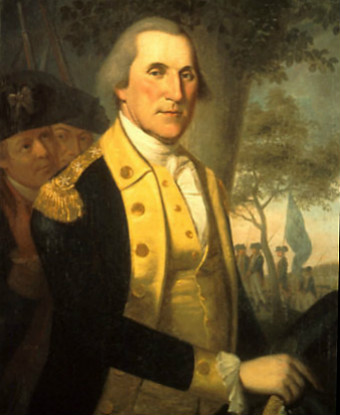Last updated: January 24, 2025
Person
George Washington

National Park Service, Independence National Historical Park
George Washington was perhaps the one indispensable man among the founders. It is hard to imagine any of the others commanding the respect needed to lead the Continental Army to victory over Great Britain, preside over the Constitutional Convention, and serve the United States as its first president. Little in Washington’s early life gave a hint of the great achievements to come. Born into the plantation elite of Virginia, he received a limited education. When he was eleven, Washington’s father died, and his half-brother Lawrence took him under his wing.
While still in his teens, Washington became a land surveyor, which gave him a solid grounding in mathematics and the evaluation of topography. This would later serve him well as a military commander. As a lieutenant colonel of the Virginia Regiment, Washington led a force into the Ohio Valley to contest French domination of that region. He was in command of the British forces at the Battle of Fort Necessity (1754), helping to bring on the French and Indian War. Washington gained valuable military experience in that conflict.
Washington married a wealthy widow, Martha Dandridge Custis, in January 1759. The couple had no children of their own, but raised Martha’s together. Inheriting Mt. Vernon, a family plantation on the Potomac River, in 1761, Washington spent the next 15 years as a planter, also serving in the House of Burgesses (the colonial legislature in Virginia). He took the patriot side in the disputes with Great Britain in the 1760s and 1770s, and was elected to the first Continental Congress in 1774. With the coming of open war with Britain in 1775, the congress decided to make Washington commander in chief of the new Continental Army, then in Cambridge. Washington had as much military experience as anyone in the colonies, and his selection helped gain the allegiance of Virginia, by far the most populous of the 13 colonies.
Experts hold widely differing views of Washington’s abilities as a general. Most would agree, though, that he performed a vital service merely by keeping a fighting force in the field through the difficult early years of the war. His greatest strokes as a commander were the surprise attacks on the garrisons at Trenton (December 26, 1776) and Princeton (January 3, 1777). These victories restored patriot morale in one of the war’s darkest periods.
After accepting the British surrender at Yorktown in October 1781, Washington retired to Mt. Vernon to revive his plantation and financial position. He was elected to the Constitutional Convention (1787) and reluctantly served as its presiding officer. Washington’s support of the Constitution was critical in its acceptance by the states. He was a virtually unanimous choice for the nation’s first president. Washington served two terms (1789-1797) and could easily have gained a third had he wished to. Instead, he established the precedent of a two-term maximum, which remained unchallenged until 1940. Washington died in 1799, as much from poor medical treatment as the underlying illness.
